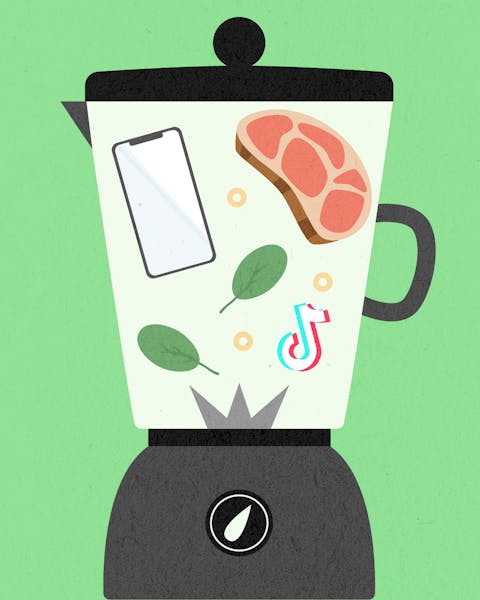Listen to the article
Social Media’s Nutrition Misinformation Crisis Threatens Public Health
Social media platforms like TikTok and Instagram have become breeding grounds for nutritional misinformation, with self-proclaimed “holistic nutritionists” and influencers promoting potentially harmful dietary practices that lack scientific backing.
A systematic review published by the National Library of Medicine found that nearly half of all nutrition-related content on social media platforms is of low quality and accuracy. The study specifically highlighted that information about weight loss and supplements contained a higher proportion of false claims compared to other nutrition topics.
“If a social media influencer says something you want to hear, you are more willing to listen and accept it without actually verifying or fact-checking the information,” explains Dr. Paul Branscum, a professor in the Kinesiology, Nutrition and Health Department at Miami University who specializes in health promotion and education.
The issue is particularly concerning for college students who may be seeking to achieve specific health or fitness goals. TikTok’s algorithm-driven content prioritizes short, engaging videos filled with buzzwords and emotionally charged messaging, often at the expense of scientific accuracy.
This digital landscape creates an environment where views and engagement trump evidence and credibility, ultimately undermining trust in legitimate health professionals and science-backed interventions.
Virginia Willard, vice president of the Student Academy of Nutrition and Dietetics at Miami University, has witnessed this problem firsthand through her work as a nutritional educator for Oxford Pantry & Social Services.
“I educated students on fitness during a debunking food myths event, and it was shocking how many students fall for misinformation on social media,” Willard said. “Students actively wash their poultry, which spreads bacteria, adopt fad diets such as the keto diet, or restrict their carb intake while actively trying to gain muscle mass.”
The prevalence of influencers promoting exclusionary diets, detoxes, and unrealistic transformations has real consequences. Many followers adopt restrictive eating patterns that can lead to nutritional deficiencies, disordered eating behaviors, and poor mental health outcomes.
Willard notes that a large following often creates a false sense of credibility for content creators. “Students will blindly follow someone who spreads myths about gluten, dairy, or the consumption of sugar just because they have a large following,” she explained. “However, you should treat nutrition as a personal thing; it’s a personal plan.”
Distinguishing between qualified professionals and self-proclaimed experts is crucial. Willard advises students to look for credentials such as Registered Dietitian Nutritionist (RDN), which indicates a recognized medical professional, rather than “nutritionist,” which can be a self-proclaimed title with no standardized educational requirements.
College campuses are responding to this challenge by offering evidence-based resources. Miami University provides weekly Lunch and Learn sessions in Phillips Hall and consultations with campus dietitians to help students navigate nutritional information.
Dr. Branscum emphasizes the importance of finding personalized approaches to nutrition. “The best way to achieve nutritional goals, such as weight loss, is to find a method that works for you,” he advised. “And if you are having a hard time finding that through your lifestyle, it is beneficial to try different methods: seeking support systems, professional help, or surgical and medical options.”
The prevalence of diet culture on social media platforms has created a concerning landscape where unrealistic body standards and restrictive eating habits are normalized. For those struggling with nutrition or experiencing confusion amid the flood of contradictory information, experts emphasize the importance of seeking professional guidance from qualified healthcare providers.
As social media continues to influence how people, particularly young adults, understand nutrition and health, the need for digital literacy and critical evaluation of health information has never been more important. Public health advocates are increasingly calling for stronger content moderation and clearer identification of credentialed experts on these platforms to help combat the spread of potentially harmful nutritional misinformation.
Fact Checker
Verify the accuracy of this article using The Disinformation Commission analysis and real-time sources.




10 Comments
Concerning that social media influencers are spreading dubious nutrition advice. We need to be vigilant about verifying health claims, especially those related to weight loss and supplements.
Absolutely. It’s a dangerous trend that could have serious consequences for public health, especially among younger audiences.
This is a timely reminder of the need for media literacy and critical thinking when it comes to nutrition advice on social media. The public deserves access to accurate, science-based information.
The spread of misinformation around diet and supplements on social media is a serious public health issue that needs to be addressed. Platforms must do more to verify the credibility of health-related content.
I agree. Responsible use of social media and fact-checking are essential to combat the proliferation of pseudoscientific health claims.
This is a good reminder to fact-check nutrition information online. Relying on unqualified sources can lead to misinformation and potentially harmful practices.
Agreed. Social media algorithms prioritize engagement over accuracy, which makes it challenging to discern reliable health advice.
Influencers promoting unproven dietary practices is a growing concern. Consumers must be critical consumers of online health information and seek out guidance from qualified medical professionals.
Well said. Fact-checking and consulting reliable sources is crucial when it comes to making informed decisions about nutrition and wellness.
It’s troubling to see the prevalence of low-quality nutrition content on social media. Platforms need to do more to curb the spread of misinformation that could endanger public health.